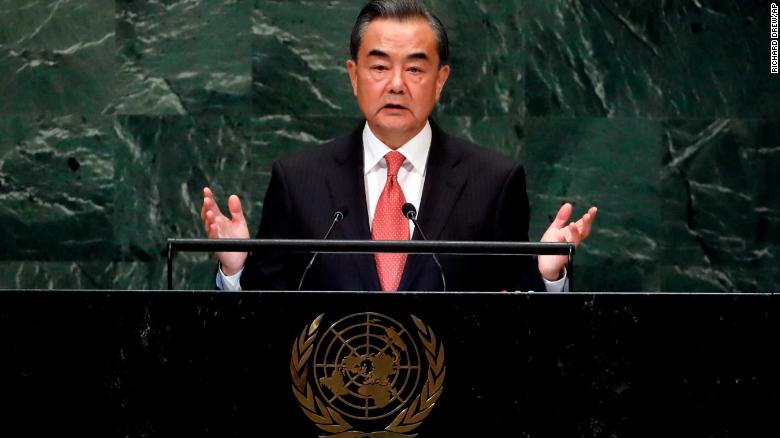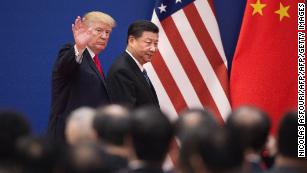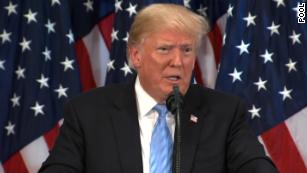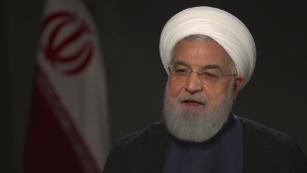China challenges Trump, says it will not be 'blackmailed' on trade
China issued a rebuke to the United States on Friday, decrying protectionism and unilateral trade moves that "bring damage to all" in a wide-ranging challenge to President Donald Trump as tensions between the two countries continue to rise.
Speaking to the United Nations General Assembly two days after Trump accused Beijing of election interference and a week after his administration announced new tariffs that mean roughly half the products China sells to the US will now be penalized, Foreign Minister Wang Yi declared that China "will not be blackmailed or yield to pressure."
"International trade is complementary and win-win by nature," Wang said. "It should not be a zero-sum game in which one gains at the expense of others, and no one should be allowed to place its own interest above the interest of others. Protectionism will only hurt oneself, and unilateral moves will bring damage to all."
Wang did not mention the US during his remarks on trade, but said Beijing wants "a proper settlement based on rules and consensus through dialogue and consultation on an equal footing." He framed China's approach as a defense of the broader free trade system against unilateral and destructive steps by others.
Trump says China is interfering in midterm elections
"China has taken steps not just to defend its own legitimate rights and interests," Wang said. "China is also acting to uphold the free trade system and international rules and order for the benefit of global recovery and the common interests of all countries."
Wang spoke after Trump this week accused Beijing of election interference meant to hurt him personally because of his stance on trade and a little more than a week after the Trump administration sharply escalated America's trade war with China.
"They do not want me, or us, to win because I am the first President ever to challenge China on trade," Trump said on Wednesday.
The US imposed a 10% tariff on $200 billion worth of Chinese goods, starting on Monday. The levy will increase to 25% at the end of the year. The additional tariffs are on top of penalties enacted earlier this year on $50 billion worth of Chinese goods. Taken together, it means roughly half of the products that China sells to the United States each year will be hit by American tariffs.
Trump claims (without evidence) Obama nearly launched war with North Korea
Trump has also threatened to launch a third round of tariffs on $267 billion in goods on Beijing. "I have great respect and affection for my friend, President Xi Jinping", Trump told the UN General Assembly on Tuesday. "But I have made clear our trade imbalance is just not acceptable. China's market distortions and the way they deal cannot be tolerated."
Defense Secretary James Mattis, asked about the recent tensions with Beijing at the Pentagon on Wednesday, said "we're sorting out obviously a period with some tension there, trade tension and all, so we'll get to the bottom of it. But I don't think that we're seeing a fundamental shift in anything; we're just going through one of those periodic points where we got to learn to manage our differences."
Those differences include some military tension. The day before Wang spoke, China had criticized the US for flying B-52 bombers in the vicinity of the South China Sea, calling it "provocative" and demanding that the US take steps to improve military relations amid heightened tensions between the two countries.
The Chinese foreign minister's remarks on trade were part of a broader criticism of US policies under Trump and seemed designed to present China as a global leader on issues that the US President didn't address in his own remarks to the UN: climate change, cyber threats, sustainable development and the importance of multilateralism, an approach US officials explicitly questioned.
"What we see today is that international rules and multilateral mechanisms are under attack, and the international landscape is filled with uncertainties and destabilizing factors," Wang said. "Should we stay committed to multilateralism or let unilateralism have its way," he asked, adding, "China's answer is clear-cut. All along, China has upheld the international order and pursued multilateralism."
Iran's Rouhani dismisses Trump's threats saying 'America is alone'
Wang touched on several global challenges that Trump didn't mention in his address to the UN, including cyber and outer space.
Wang also directly addressed specific US policies, including its approach to North Korea and Iran.
The Chinese foreign minister called for the US to make more concessions to North Korea instead of insisting that the world join the US in maintaining intense economic pressure on Pyongyang through sanctions.
"We believe it is also right for the US to make timely and positive responses so as to truly meet the DPRK half way," Wang said. The day before, in a UN meeting on the Korean peninsula, he called for the US to formally end the war with North Korea and declare peace.
And he called for continued implementation of the Joint Comprehensive Plan of Action, the formal name for the Iran nuclear deal that Trump withdrew from in May. The US is now engaged in an effort to drastically ratchet up pressure on Iran in what US officials say is an attempt to change Tehran's behavior.
"If the agreement fails to be implemented, the international non-proliferation regime will be undermined, the authority and role of the Security Council challenged, and peace and stability in both this region and the wider world jeopardized," Wang said. "That is a scenario in which no one stands to gain."
"State-to-state relations should be based on credibility, not willful revocation of commitments," Wang said. "International cooperation should be guided by rules, not impulse." He added that what "we need to do is to replace confrontation with cooperation and coercion with consultation."
News Courtesy: www.cnn.com














